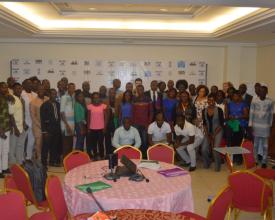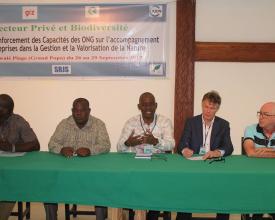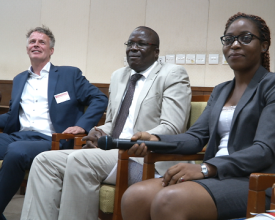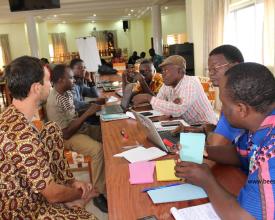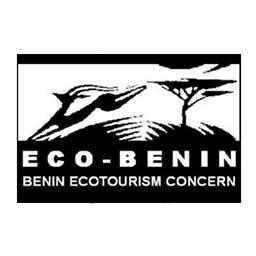
Comprometer a una multinacional cementera y sus filiales para que mejoren y amplíen sus esfuerzos de conservación de la biodiversidad en Benín.
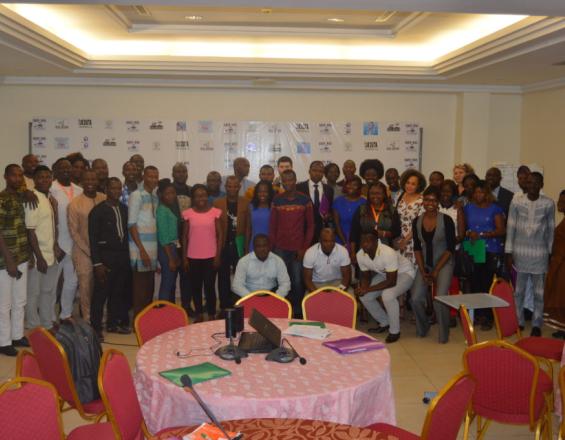
Las ONG Benin Environment and Education Society (BEES) y Eco-Benin han estado trabajando con Heidelberg Cement Group y sus filiales SCANTOGO y CIMBENIN para ampliar sus esfuerzos de conservación de la biodiversidad. Las ONG y las empresas se reunieron en 2018, primero en un concurso de premios relacionados con la biodiversidad organizado por Heidelberg Cement Group y más tarde a través de una serie de talleres y visitas a las instalaciones. Siguieron múltiples debates sobre cuestiones y oportunidades de conservación. Eco-Benín y BEES apoyan ahora a Heidelberg en acciones como la conservación y protección de hipopótamos, tortugas marinas, manatíes y manglares, así como en eventos de compromiso con la comunidad, trabajando en la aplicación de un plan de acción de RSC a partir de una carta de RSC adoptada por el Estado, y motivando a otras empresas para que tengan en cuenta las cuestiones relacionadas con la biodiversidad. Con las filiales, trabajan en la reserva transfronteriza de Mono, gestionada por la comunidad y declarada MAP y Reserva de la Biosfera por la UNESCO en 2017.
Contexto
Défis à relever
Uno de los retos era implicar a una empresa que ya era consciente de los esfuerzos en materia de biodiversidad y contribuía a ellos, y trabajar con ella para impulsarlos aún más. Al igual que ocurre con las actividades empresariales de RSC, aunque beneficiosas, las actividades no siempre son sustanciales y sostenibles, por lo que fue necesario demostrar que era importante ir más allá de la situación existente.
Ubicación
Procesar
Resumen del proceso
Gracias a que Heidelberg Cement ya tenía en cuenta las cuestiones relacionadas con la biodiversidad y a la puesta en marcha de una iniciativa de recompensa, pudieron ponerse en contacto con ONG que podían ayudarles a hacer más. El programa del SRJS proporcionó las herramientas adecuadas para que BEES y Eco-Benin se empoderaran y se prepararan para comprometerse con Heidelberg. Gracias al contacto existente con la UICN, que facilitó las conversaciones entre las ONG y Heidelberg, pudieron celebrarse más debates que permitieron comprender los obstáculos y proponer ideas de colaboración sustanciales. Estas ideas de actuación se llevaron adelante con la ayuda de un defensor de la empresa. En resumen, beneficiarse de los contactos con una organización internacional, aprovechar el interés de la empresa por la biodiversidad, contar con un "defensor" en la empresa y aplicar las valiosas competencias adquiridas a través de la formación contribuyeron al éxito de este compromiso.
Bloques de construcción
Consideración de la biodiversidad existente y un defensor en la empresa.
Heidelberg ya contaba con una política de biodiversidad y estaba organizando una iniciativa de recompensa relacionada con la biodiversidad. Esto significaba que ya existía una buena base sobre la que construir, y alguien que abogara firmemente por ella dentro de la empresa.
Factores facilitadores
Para que una empresa sea consciente de los factores de sostenibilidad y biodiversidad , puede depender de la presencia de un empleado o directivo concienciado, de la respuesta a presiones legales, financieras o sociales, o de la voluntad a lo largo de los años de debatir con la sociedad civil.
Lección aprendida
Era necesario que las ONG estudiaran la empresa y evaluaran el grado de concienciación medioambiental de la misma, y que supieran dónde y cómo conseguir el mayor impacto.
Refuerzo de las capacidades de las ONG encargadas de la ejecución
La participación en el Programa Conjunto de la UICN sobre Recursos Compartidos para la capacitación de la sociedad civil en materia de participación empresarial ayudó a las ONG a aumentar sus posibilidades de éxito, pero también a conectar con otras ONG en el evento. La formación incluyó la promoción, la creación de confianza con la empresa, el diseño de un buen enfoque de participación empresarial y la participación con una empresa de una manera amistosa sin dejar de ser fiel a los principios. A través de esta formación, la UICN facilitó a las ONG ejecutoras su contacto con una persona clave de la empresa, lo que reforzó aún más su compromiso.
Factores facilitadores
El SRJS pretendía crear un espacio de aprendizaje que reuniera a la sociedad civil para compartir conocimientos con el fin de aumentar el impacto del compromiso empresarial, teniendo en cuenta al mismo tiempo sus contextos y necesidades. Las ONG beninesas que participaron en la formación también estaban dispuestas a saber más sobre cómo influir eficazmente en las empresas, así como a compartir conocimientos con otras ONG de su entorno.
Lección aprendida
- Es necesario diseñar una estrategia de compromiso empresarial adecuada porque un tipo de estrategia no sirve para todas las situaciones.
-Es importante que una ONG se acerque a una empresa de forma cordial, manteniendo al mismo tiempo sus posiciones.
-La creación de confianza entre las empresas y las OSC es primordial para alcanzar los objetivos de sostenibilidad.
-Las ONG deben trabajar juntas y aprender unas de otras para aumentar su impacto.
Impactos
Los esfuerzos de Heidelberg Cement en materia de biodiversidad no sólo contribuyen positivamente a la biodiversidad, sino que también proporcionan pruebas sólidas e inspiradoras para incentivar al sector privado beninés a seguir su ejemplo. La creación de la Carta de RSC de Heidelberg Cement garantizará que otras empresas de ese entorno sean más conscientes de sus impactos y dependencias de la naturaleza y traten de participar en los esfuerzos de biodiversidad y contribución, con el apoyo de otras ONG.
Esta experiencia de compromiso con las empresas empoderó tanto a BEES como a Eco-Benín, ya que con la experiencia viene el conocimiento en forma de lecciones aprendidas para futuras acciones de influencia sobre las empresas. El éxito de este trabajo también constituye una prueba crucial para convencer a otras empresas de que ellas también pueden contribuir a los esfuerzos por la biodiversidad y beneficiarse de ello. Eco-Benín y BEES confiaron más en las habilidades que aprendieron y perfeccionaron a lo largo de este viaje, para poder encontrar otras empresas a las que apoyar en su camino hacia la sostenibilidad.
Beneficiarios
- Heidelberg Cement: reforzó el enfoque y las acciones en materia de biodiversidad, apoyando la elaboración de informes de sostenibilidad y su reputación.
- BEES y Eco-Benín: aprendieron de esta experiencia e implicaron a otras empresas.
- Comunidades de la reserva transfronteriza de Mono.
Objetivos de Desarrollo Sostenible
Historia
Desde 2014, Heidelberg Cement (HC) ha puesto en marcha los "Quarry Life Awards" para recompensar proyectos científicos y comunitarios innovadores que sensibilicen y eduquen a los agentes de las canteras sobre cuestiones de biodiversidad, y ayuden a la empresa a conectar con sus grupos de interés locales. Fue en este marco donde BEES y HC pudieron interactuar. Gracias a los contactos previamente establecidos entre la UICN y el antiguo coordinador de Heidelberg para la conservación de la biodiversidad, la información sobre la biodiversidad y los proyectos de restauración del paisaje, BEES y Eco-Benin pudieron implicarlos en más acciones. Además, Heidelberg Cement ya contaba con una política de biodiversidad, lo que proporcionó a las ONG un buen punto de entrada y una base sobre la que construir.
BEES y Eco-Benín habían participado en el Programa Recursos Compartidos, Soluciones Conjuntas (SRJS), en el que aprendieron más sobre enfoques eficaces de compromiso empresarial y sobre cómo presentar argumentos convincentes y beneficiosos para todas las partes. En sus conversaciones, se dieron cuenta de que la empresa tenía la voluntad de hacer más, pero sólo necesitaba más apoyo y motivación para ello. Gracias al entusiasmo del antiguo coordinador, pudieron impulsar aún más el debate sobre la biodiversidad en la empresa. Las dos ONG y Heidelberg Cement colaboraron para conservar y proteger especies silvestres amenazadas, según la Lista Roja de la UICN, al otro lado de la frontera de Togo y Benín. Ahora que la dirección de la empresa está totalmente a bordo, motiva y presiona a los puntos focales de las empresas de Benín y Togo para que trabajen más en la biodiversidad, que luego colaboran con las ONG para ayudarles a preparar las acciones y la documentación correspondientes. BEES y Eco-Benín también han firmado un acuerdo con ScanTogo y CIMBénin, dos filiales de Heidelberg Cement, que estipula la plantación de 20.000 plantas en la Reserva de Bouche du Roy por parte de Eco-Benín.
Desde entonces, otras empresas han tomado nota de este éxito y quieren sumarse a los esfuerzos en pro de la biodiversidad. De hecho, antes de esto, la mayoría de las empresas no se daban cuenta de que podían actuar para salvaguardar la naturaleza a esta magnitud. Además, el Consejo Nacional ha adoptado una Carta de RSE que incluye un marco de autoevaluación para las empresas, lo que les permitirá elaborar un plan de acción de RSE; es probable que las ONG les ayuden a garantizar la integración de la biodiversidad en el plan. Por último, este éxito también ha equipado y motivado aún más a Eco-Benín y BEES para aumentar su compromiso empresarial.
